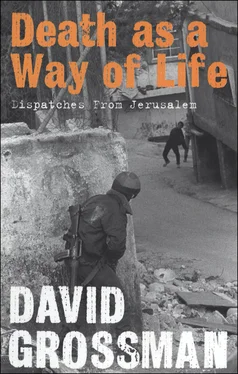David Grossman - Death as a Way of Life
Здесь есть возможность читать онлайн «David Grossman - Death as a Way of Life» весь текст электронной книги совершенно бесплатно (целиком полную версию без сокращений). В некоторых случаях можно слушать аудио, скачать через торрент в формате fb2 и присутствует краткое содержание. Год выпуска: 2013, Издательство: Bloomsbury Publishing, Жанр: Прочая документальная литература, на английском языке. Описание произведения, (предисловие) а так же отзывы посетителей доступны на портале библиотеки ЛибКат.
- Название:Death as a Way of Life
- Автор:
- Издательство:Bloomsbury Publishing
- Жанр:
- Год:2013
- ISBN:нет данных
- Рейтинг книги:5 / 5. Голосов: 1
-
Избранное:Добавить в избранное
- Отзывы:
-
Ваша оценка:
- 100
- 1
- 2
- 3
- 4
- 5
Death as a Way of Life: краткое содержание, описание и аннотация
Предлагаем к чтению аннотацию, описание, краткое содержание или предисловие (зависит от того, что написал сам автор книги «Death as a Way of Life»). Если вы не нашли необходимую информацию о книге — напишите в комментариях, мы постараемся отыскать её.
Death as a Way of Life — читать онлайн бесплатно полную книгу (весь текст) целиком
Ниже представлен текст книги, разбитый по страницам. Система сохранения места последней прочитанной страницы, позволяет с удобством читать онлайн бесплатно книгу «Death as a Way of Life», без необходимости каждый раз заново искать на чём Вы остановились. Поставьте закладку, и сможете в любой момент перейти на страницу, на которой закончили чтение.
Интервал:
Закладка:
As in an old science fiction story, an entire nation has been caught in a time warp, where it spins round and round, doomed to relive all the worst evils of its tragic history. Maybe, for that reason, when Israel is at the height of its military power, Israelis themselves lose their ability to act. They become nonpersons, victims in fact; only, this time they are their own victims.
Six million people have allowed their mind, their will, and their judgment to degenerate into infuriating criminal passivity. They have lost their ability to distinguish between right and wrong. Most of all, they have lost the healthy instinct that should rouse and shake them, that will remind them what their goals and needs are, their most profound ones as a people and as a society.
An entire nation is in a coma. It is as if the people have voluntarily anesthetized themselves, suspended their discernment, so as not to face up to the quiet horror of their condition.
Just to think, for example, that the government is funneling more and more money into construction in the settlements in the territories, which will complicate and convolute the situation even further and make any political solution impossible.
Just to think, that an entire nation has forfeited its future, its only chance of getting out of the trap it is in, simply to humor the messianic, militaristic urges of a few thousand — no more — fanatics who insist on pushing themselves into Hebron, Nablus, and the Gaza Strip.
And, worst of all, consider that we have been ruling over another nation for thirty-one years, even though we have the alternative of not doing so.
But that’s already become a cliché, “to rule over another nation.” The Israeli eye is already trained to skip over the small items in the newspaper: the Palestinian babies dying at roadblocks, the children fainting from thirst in the refugee camps because Israeli officials control the water supply, thousands of families whose homes are bulldozed on the grounds of being “illegal construction.” Who can face up to all this nauseating detail? Who can acknowledge that this is actually happening. That it is really happening to us?
As in a fairy tale, as in a nightmare: Hush … the entire kingdom has fallen asleep.
That is, people are awake. They move, produce sounds, travel, enjoy themselves, do business. Lots of activity, lots of noise.
Yet underneath all that, the same gnawing corrosion of the heart, the feeling that something here is hollow, that its movement is but inertial, that it is disconnected, excised from its essence.
We’ve been so wonderful at putting ourselves to sleep, at suspending our understanding and our will, that even those who oppose the government’s policy don’t have the strength to really do anything against it.
And so it happens that, despite the conspicuous void in this country’s leadership, the opposition is unable to produce a single person who can respond to the profound need for restoration, someone who could sweep along the masses simply by, finally, offering them anything, a way, a chance, an awakening.
Perhaps Israel is now paying the heavy price of too many years of stubbornness, of opposition to compromise and refusal to understand reality as it is. Perhaps something really horrible has happened to us. Perhaps the peace process came to us a bit too late.
Because when you keep rejecting something for so long, when you so much don’t want something, you are liable, in the end not to want anything. In other words, you are liable to lose your will itself. So the result is a nation that has spent years investing huge amounts of energy in not wanting and has now reached a state in which it is so passive that anything can be inflicted upon it, anything at all.
Maybe I’m wrong. Maybe everything really is operating as it should, according to a well-thought-out plan, a plan of genius that is beyond my comprehension.
I may well be wrong, but I know that something in me is dying. I no longer have that spark inside that life here always ignited in me. With all my criticism and all my pain, I also had joy, even pride, over belonging to such a unique, unprecedented human enterprise. So full of promise for the future.
I am trying to comfort myself with the hope that, despite it all, a change will happen soon (not a withdrawal of a few miles here or there; rather, a profound change of the way the world is seen). After all, where there are living beings, immobility cannot be sustained for long. Perhaps we will soon be released from this evil spell. But I also know that there are parts of the soul, the individual soul and the collective soul, that cannot be suspended “for the time being,” or only “until circumstances change.” Because afterward, you cannot reclaim those parts.
When the change finally takes place — and let us hope that it will be a change for the better, not another war or popular uprising or who-knows-what — when we emerge from the cocoon that encloses us, it is liable to be too late. We may make a few political gains, we may well retain a few strategic hills and roadblocks, but the main thing — the spark that will truly ensure we maintain our identity and continuity — could already be lost.
May we wake up at last, may we stop straying through this nightmare, which is no one’s dream.
Shana Tova, Happy New Year.
Beware, Opportunity Ahead
September 1999
In a landslide victory over Netanyahu, Labor leader Ehud Barak won the May 18, 1999, Israeli general elections. The former army general vowed to renew the peace talks and declared that he was ready to negotiate land for peace. On September 4 of that same year, Barak and Arafat met in the Egyptian Sinai resort of Sharm el-Sheikh to sign the Sharm el-Sheikh Memorandum on Implementation Timeline of Outstanding Commitments of Agreements Signed and the Resumption of Permanent Status Negotiations. The issues agreed upon included the gradual transfer of areas to Palestinian control, security, and safe passage between the West Bank and the Gaza Strip.
The Israelis and the Palestinians didn’t dance in the streets after this new agreement. The two nations are already well aware of the disparity between, on the one hand, the euphoria often characteristic of the formal language used in signing ceremonies and, on the other hand, the actual execution of the agreements. The latter is generally done without enthusiasm, in a petty and even resentful way.
The present agreement contains no dramatic change from the Wye Plantation agreement, achieved eleven months ago and much trumpeted in Washington.
But it would be a mistake to judge this agreement only on the basis of the apparent successes that one side or the other scored. The great achievement is that the peace process, which Benjamin Netanyahu suspended and slowed down as much as he could for nearly three years, is again back on track.
This agreement and the way it was achieved are in large part the agenda which Israel’s new prime minister, Ehud Barak, has presented to his people. When we examine it, we find a few very clear pieces of information. The first, and most important, is that Barak does, in fact, intend to lead Israel into a historic peace with the Palestinians. The second piece of information is that the price of this peace — handing territories over to the Palestinians — still looks nearly intolerable to Barak. He is not necessarily willing to pay it. The third piece of information arising from the way Barak conducted the negotiations is that, despite the great historic opportunity, both sides continue to treat each other with suspicion and animosity, as they became accustomed to doing during the Netanyahu period.
Barak most certainly has a bold and revolutionary vision of a new Middle East, and unlike previous Israeli leaders, he can carry it out without encountering too much opposition from the great majority of Israelis. Yet Barak suffers from the same infirmity as his predecessors. He lacks sensitivity to the problems of his partner — Arafat — and to the Palestinian people’s terrible distress and years of frustration.
Читать дальшеИнтервал:
Закладка:
Похожие книги на «Death as a Way of Life»
Представляем Вашему вниманию похожие книги на «Death as a Way of Life» списком для выбора. Мы отобрали схожую по названию и смыслу литературу в надежде предоставить читателям больше вариантов отыскать новые, интересные, ещё непрочитанные произведения.
Обсуждение, отзывы о книге «Death as a Way of Life» и просто собственные мнения читателей. Оставьте ваши комментарии, напишите, что Вы думаете о произведении, его смысле или главных героях. Укажите что конкретно понравилось, а что нет, и почему Вы так считаете.












